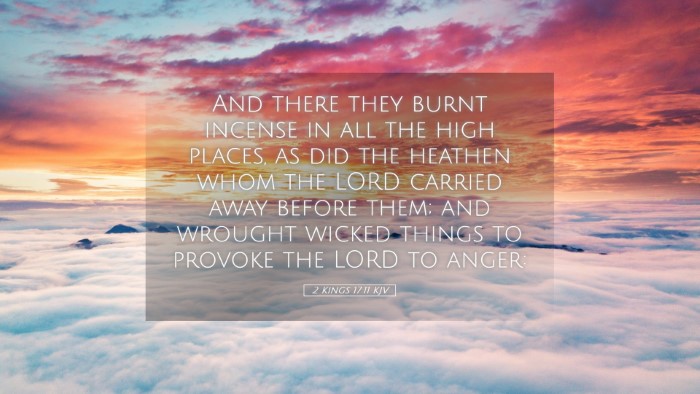Commentary on 2 Kings 17:11
Verse: "And there they burnt incense in all the high places, as did the heathen whom the LORD carried away before them; and wrought wicked things to provoke the LORD to anger."
Introduction
The verse from 2 Kings 17:11 encapsulates the religious practices of the Israelites during a period of decline. This commentary aims to explore the historical context, theological implications, and moral lessons derived from this passage, drawing from the insights of noted public domain commentators.
Historical Context
The narrative of 2 Kings reflects the tumultuous period of Israel's history, particularly the Northern Kingdom's descent into idolatry and moral chaos. This verse emphasizes the influence of surrounding nations on Israel's practices, indicating a time when the Israelites deviated from worshiping Yahweh to adopting the customs of those whom the Lord drove out before them.
Idolatry Among the Israelites
This passage serves as a critical reminder of how even a chosen people can stray from divine mandates. The 'high places' mentioned serve as focal points for worship, yet they represent a distortion of true worship prescribed by God. Matthew Henry notes that this practice was a great abomination, showing how they chose to follow the ways of the heathens instead of the commands given by God through Moses.
Theological Implications
The act of burning incense in high places signifies a complete rejection of the covenant established by God. Albert Barnes elucidates that this behavior not only provoked the Lord but also illustrates a fundamental misunderstanding of worship. The Israelites, by engaging in such practices, demonstrate a lack of reverence for God’s holiness and a desire to conform to societal norms rather than divine statutes.
The Nature of Sin
Adam Clarke points out that sin often begins with seemingly minor compromises, leading to greater acts of rebellion against God. The Israelites' adoption of foreign practices highlights the persistent human tendency to seek fulfillment in what is familiar rather than what is holy and righteous.
Moral Lessons
From 2 Kings 17:11, there are several moral lessons that can be extracted, relevant for pastors, students, and scholars alike.
- The Danger of Cultural Assimilation: The verse underscores the peril of adopting practices from a culture that opposes divine truth. It serves as a warning to modern believers to evaluate their own practices and avoid conformity to secular beliefs that contradict biblical teachings.
- The Importance of True Worship: The Israelites' choice to worship in high places signifies a misunderstanding of God's requirements for worship. True worship must be conducted in spirit and truth (John 4:24), not based on personal preference or societal trends.
- Accountability to God: The actions described in this passage illustrate a profound sense of accountability. The Israelites' defiance against God's will emphasizes that knowledge of God carries an obligation to live according to His commandments.
- Consequences of Rebellion: The verse also foreshadows the impending judgment that would fall upon the Northern Kingdom due to their unfaithfulness. This serves as a stark reminder that persistent sin leads to judgment, both corporately and individually.
Conclusion
2 Kings 17:11 serves as a poignant reminder of the spiritual pitfalls that accompany the neglect of true worship and obedience to God. The insights gleaned from the commentaries of Matthew Henry, Albert Barnes, and Adam Clarke shed light on the historical significance, theological depth, and moral teachings of this verse. As contemporary believers engage with Scripture, this passage navigates us toward a deeper understanding of fidelity to God amidst the pressures of a compromising culture.


